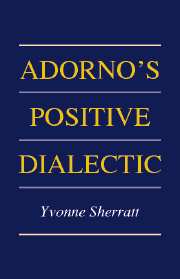Book contents
- Frontmatter
- Contents
- Preface
- Abbreviations
- Adorno's Positive Dialectic
- General Introduction
- PRELUDE TO ADORNO'S POSITIVE DIALECTIC
- Prelude I: Adorno's Intellectual Tradition: German Philosophy
- Prelude II: Adorno's Intellectual Tradition: Sigmund Freud
- ADORNO'S POSITIVE DIALECTIC: INTRODUCTION
- PART I NEGATIVE THESIS: THE DECLINE OF ENLIGHTENMENT
- 1 The Decline of Subjectivity: The Instincts
- 2 The Decline of Subjectivity: Narcissism
- 3 The Decline of Knowledge Acquisition
- 4 Knowledge Acquisition: A Negative Solution
- PART II POSITIVE THESIS: THE REDEMPTION OF ENLIGHTENMENT
- Bibliography
- Index
2 - The Decline of Subjectivity: Narcissism
Published online by Cambridge University Press: 10 August 2009
- Frontmatter
- Contents
- Preface
- Abbreviations
- Adorno's Positive Dialectic
- General Introduction
- PRELUDE TO ADORNO'S POSITIVE DIALECTIC
- Prelude I: Adorno's Intellectual Tradition: German Philosophy
- Prelude II: Adorno's Intellectual Tradition: Sigmund Freud
- ADORNO'S POSITIVE DIALECTIC: INTRODUCTION
- PART I NEGATIVE THESIS: THE DECLINE OF ENLIGHTENMENT
- 1 The Decline of Subjectivity: The Instincts
- 2 The Decline of Subjectivity: Narcissism
- 3 The Decline of Knowledge Acquisition
- 4 Knowledge Acquisition: A Negative Solution
- PART II POSITIVE THESIS: THE REDEMPTION OF ENLIGHTENMENT
- Bibliography
- Index
Summary
INTRODUCTION
In this chapter our aim, as with the previous chapter, is to understand the psychological foundations of how enlightenment declines to myth. Here we focus upon examining Adorno's analysis of the failure of enlightenment due to problems within the structural boundary around the self. Adorno sees enlightenment knowledge acquisition as entailing certain traits in the structure of the self which become problematic for maintaining the strength of Subjectivity and knowledge acquisition itself.
First, we depict Freud's analysis of the structural boundary. Second, we show how Adorno develops Freud's ideas in order to demonstrate that enlightenment knowledge acquisition entails a particular structure of the self. Third, we depict the traits in the structure of the self implied by mythic knowledge acquisition. Fourth, we show how the boundary around the self implied by enlightenment leads paradoxically to the collapse of that self and the resultant loss of enlightenment knowledge acquisition, whereby, enlightenment regresses to myth.
FREUD
Freud considers that the principal structure of the self is the boundary surrounding it. This develops in the following way. At the first stage of life there exists merely a state of unboundedness. This is referred to by Freud as the stage of primary narcissism. It is, he says, ‘the universal and original state of things’ (Freud, 1916–1917: 465). At such a stage the ‘self’ has no sense of the internal and the external. As such, it cannot distinguish between sensations arising from itself and those arising from the external world.
- Type
- Chapter
- Information
- Adorno's Positive Dialectic , pp. 97 - 110Publisher: Cambridge University PressPrint publication year: 2002



